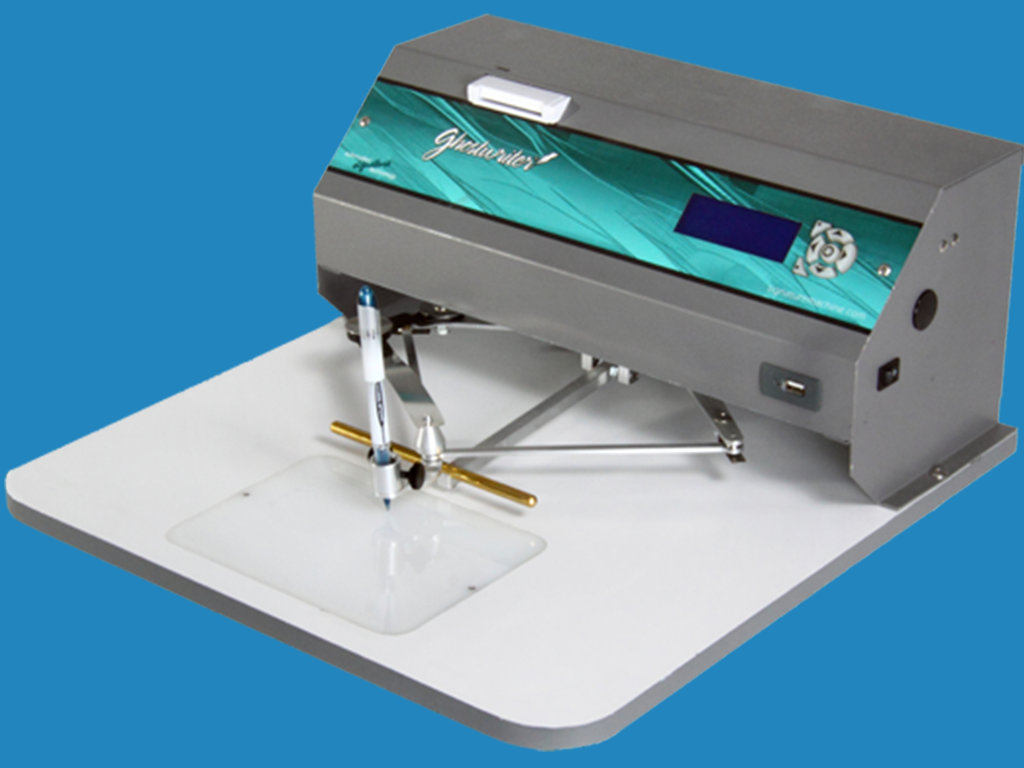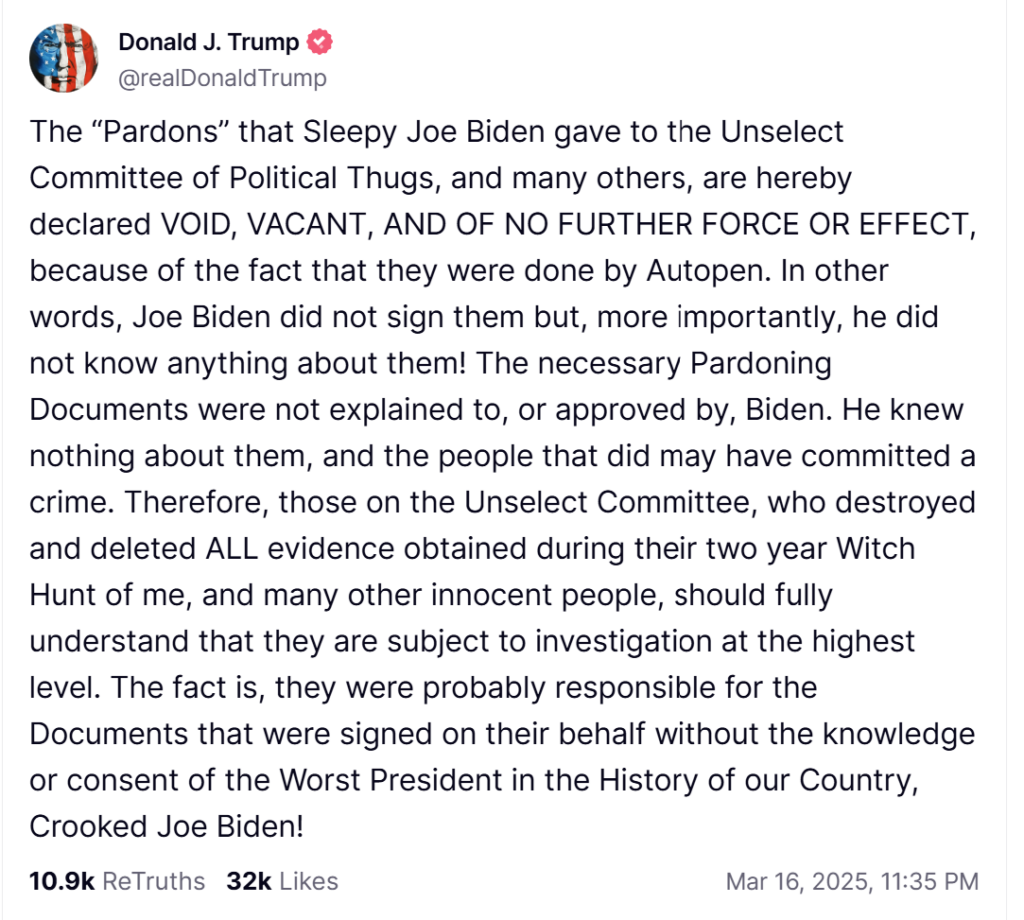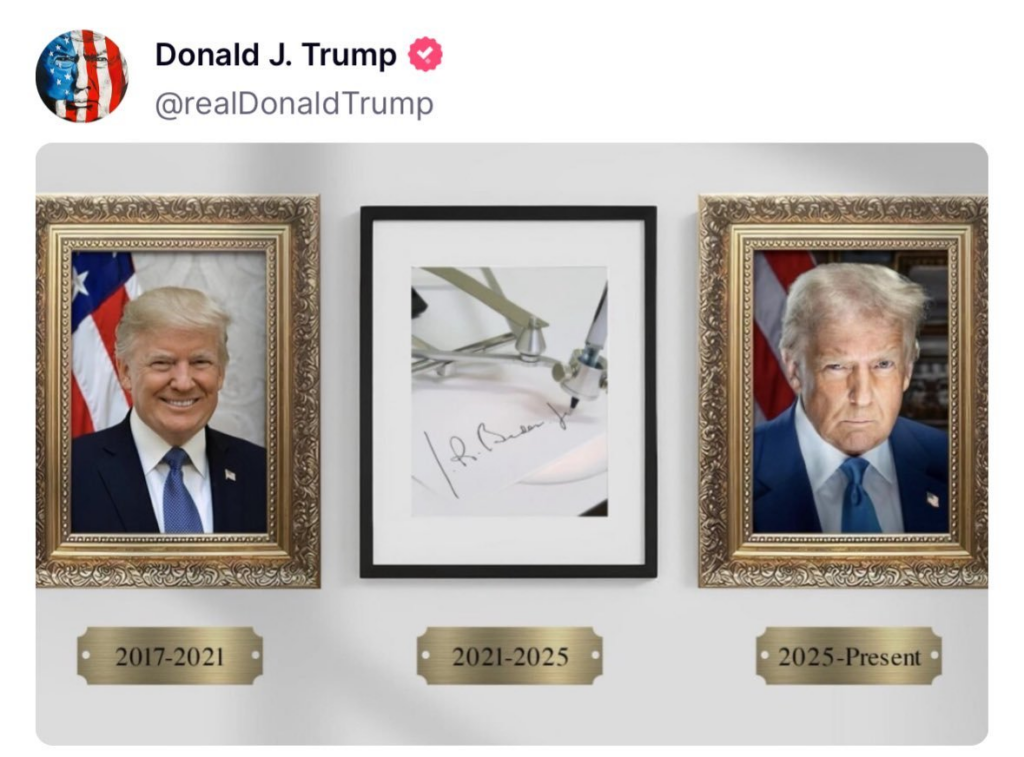Justice
Are Biden’s AutoPen Signatures Valid?
Don’t let the autopen confuse the issue. It would be no different if they had used a signature rubber stamp.

Apparently, with a few exceptions, during his four years in the White House Joe Biden’s signature was placed on laws, executive orders, pardons, commissions, and maybe foreign obligations, all using an autopen. In other words, though Biden’s “signature appears on numerous documents, he really never signed hardly anything. A machine, known as an autopen, signed everything in his name. There’s good reason to believe that Biden didn’t even know what was being signed by his staff in his name. Congress loves autopens. They use them to sign letters to their constituents so that the recipients think their Senators or Representatives really cares enough to respond personally, while the truth is that some rather lowly staff person prepared a response and signed the letter using an autopen.
UPDATE: President Trump has now announced that he considers the pardons given by Joe Biden to members of the “Jan. 6th” Committee and to others to be void.
“The ‘Pardons’ that Sleepy Joe Biden gave to the Unselect Committee of Political Thugs, and many others, are hereby declared VOID, VACANT, AND OF NO FURTHER FORCE OR EFFECT, because of the fact that they were done by Autopen. In other words, Joe Biden did not sign them but, more importantly, he did not know anything about them! The necessary Pardoning Documents were not explained to, or approved by, Biden. He knew nothing about them, and the people that did may have committed a crime,” Trump posted on Truth Social.

End UPDATE
According to Oversight Project on X, “We gathered every document we could find with Biden’s signature over the course of his presidency. All used the same autopen signature except for the the announcement that the former President was dropping out of the race last year. ”
Credit: The Oversight Project @OversightPR
But laws, executive order, pardons, commissions and a slew of vital legal documents are very different than constituent replies.
Does it matter if the President uses an autopen, rather than a hand-held pen, to sign a bill into law? We think it does matter.
When legislature passed by Congress comes over to the White House for signature, the U.S. Constitution requires that the President to “sign” the bill into law:
“Every Bill which shall have passed the House of Representatives and the Senate, shall, before it become a Law, be presented to the President of the United States; If he approve he shall sign it…” Article I, Section 7.
So let’s just push aside the autopen discussion for just a moment and frame this issue in terms of a rubber stamp. In this scenario, the President has a nice rubber stamp with his signature on it inside his desk drawer. A bill has been passed by Congress and awaits his signature. So he reaches into his desk drawer, takes out his signature rubber stamp and puts an imprint of his signature on the page. Does this meet the Constitutional requirement that “he shall sign it”? What if, by specific authority from the President a staff member is told to place the rubber stamp imprint on the bill? What if the staff member does so on his or her own, knowing that the president would approve if asked? Our point is that there is no way for the American public to know the true facts, and that is why the president’s own signature is required.
Since the Constitution requires in no uncertain terms, and in no ambiguous terms, that if the President approves the bill “he shall sign it,” this means he is signing it pen in hand, i.e., neither a rubber stamp signature nor an autopen signature (which are really not very different in our analysis) would constitutionally suffice.
But could he instruct his secretary, whom he trust implicitly and who has learned to write his signature with perfection, to sign the document for him, so that, with his authority and approval, she writes his perfect signature on the paper? Would this be valid? No, because he didn’t follow the constitutional requirement that, “he shall sign it.” Why would this be any different if the signature is written by a machine or printed by a rubber stamp? We see no basis upon which this would meet the constitutional standard.
Oh wait! This is 2025. We have computers that can create documents already including a signature in another color. We don’t need autopens or rubber stamps anymore. Anyone can print their signatures on anything. Why are we even talking about autopens anymore? Why are they so special? They do nothing more than copy and print a signature on a piece of paper. We can all do this on our computers. But would our computerized signature be valid on a Deed?, on a Promissory Note?, on a Will or Trust? No, without argument, we all know that some documents require an original authentic signature.
Suppose you go to a sporting memorabilia store and they have baseballs signed by Babe Ruth and footballs signed by Joe Namath. Would you pay less for them (or probably not buy them at all) if you knew that the signature was a facsimile placed on the ball by an autopen machine? Obviously, we would not accept this. We would call this a phony signature. We would label it as a fraud.
Just to complete these thoughts, let’s ask few slightly different questions with a common theme: What if the President were right there, standing next to the autopen, and it was used with his authority? Would this be a valid signature? Now what if he weren’t there, and there is merely a claim that he had given his authority? What if he can’t remember if he gave his authority or not, much time having passed and many documents having been “signed”? How would we even know if a staff member had used the machine to sign something without the authority of the President?
This is why we require the President’s actual hand-written signature. If every important document is required to be signed by the President, then there can be no question as to whether he authorized the signature, or if it were done by some staffer, either rogue, or with a pretty good idea of what the President would want.
So are we saying “No” to autopens just because they had no autopens in 1776 or 1789, and thus used the quaint term “sign” in the Constitution? Just realize that even back then high-level people had secretaries or clerks or aides who could sign for them, or place their seal on a document with the requisite authority and approval. Still, the Constitution requires that “he shall sign it.” We don’t think the Constitutional Convention debated the alternative language, “He shall cause his facsimiles signature to be placed upon the paper.”
We are told that on some few occasions, some previous presidents also used autopens. Our analysis would be no different for any former president. But then again, we also know of Presidents flying back to Washington just to sign legislation, and we also know of flights made to various placed in the country and abroad to bring bills to presidents so that they could sign them. It would have been a lot easier to use an autopen, or a rubber stamp, or even instruct a trusted secretary to sign the president’s name. But we have known since the Constitution was written that legislation, to be approved by the president, must be signed. A facsimile signature, a computer signature, an autopen signature, a signature rubber stamp, or even the personal secretary’s well-formed copy of the authentic signature will not suffice.
However, as a reality check, when talking about bills passed by Congress, much of this does not really matter, because invalidating the signature would cause the bill not to have been signed, and a bill that is not signed within ten days (not counting Sundays) is automatically approved unless vetoed and sent back to Congress (except during a Congressional adjournment). On this issue, the Constitution states:
“If any Bill shall not be returned by the President within ten Days (Sundays excepted) after it shall have been presented to him, the Same shall be a Law, in like Manner as if he had signed it, unless the Congress by their Adjournment prevent its Return, in which Case it shall not be a Law.
So, we conclude that as to all laws signed with the autopen, none of the signatures are constitutionally valid, but the laws, having not been vetoed and sent back, still became valid laws.
But what about other documents, such as executive orders, or pardons, or commissions? There is no constitutional requirement for a personal signature on these items, rather where a standard is even mentioned it only vests the president with authority and power, as in “he shall have Power to grant Reprieves and Pardons for Offences against the United States,” and he “shall Commission all the Officers of the United States.”
So now this becomes a more difficult issue. He, and no one else, has the power to grant pardons, but perhaps he can authorize the use of an autopen to sign a specific pardon. The problem is knowing if he genuinely granted the pardon or if someone else did so. This likely would not present a problem in a White House with a competent president, but it is becoming increasingly clearer that Joe Biden didn’t run his own presidency. He was incompetent and suffered from advancing dementia. It was widely believed, at least by those without a vested interest in supporting his presidency, that the White House was run by senior staff, many from the Obama years — names such as Susan Rice, Jake Sullivan, and Ron Klain are often suggested as the persons really running the Biden presidency — and that poor, befuddled Joe was only a figurehead in his own home.
Nevertheless, if the official records of the White House show a pardon or an executive order, or a commission that was approved by Biden, we would think there is legally an assumption of legitimacy, or at the least a rebuttable presumption of legitimacy.
What might overcome that presumption: For one, the White House issued six pardons on December 30, 2022, to six criminals (each pardon document with the exact same signature), each attesting that it was signed at Washington, D.C., though it was known that Biden was was vacationing the U.S. Virgin Islands. So that at least may rebut the validity of the signature, but does it necessarily mean that he did not grant the pardons by advising his staff of his decision to do so? Well, if you can show that the signatures are not real, and can show that the attestation is not true, then you at least have sufficient evidence to legitimately question the validity of the pardon documents.
A second example: Speaker Johnson recounts how he spoke with Joe Biden and asked him why he had paused Liquid Natural Gas exports to Europe:
“He looks at me, stunned. ‘I didn’t do that.’
I said, ‘Mr. President, Yes you did. It was like three weeks ago.’ He was arguing with me.”
Speaker Johnson concluded that Biden “was not lying to me. He genuinely did not know what he had signed.” But perhaps Biden had not signed anything, but the autopen had, perhaps without his knowledge.
And how would you ever know be able to investigate the truth? Under oath anyone involved with facilitating the pardons will swear to God that they were carrying out Biden’s Orders. And Biden’s testimony, if you could get that, would likely be inadmissible as it is widely believed that he has no reliable memory.
Missouri’s Attorney General Andrew Bailey has written to the DOJ questioning “the legality of presidential actions in light of President Biden’s mental decline.”
“By now, Biden’s mental decline is famous. Under the 25th Amendment, his inability to make decisions should have meant a succession of power,” Bailey wrote. “Instead, it appears staffers and officers in the Biden administration may have exploited Biden’s incapacity so they could issue orders without an accountable President of sound mind approving them.” Bailey ent on to say, “That would explain why the Biden administration’s orders were aggressively much farther to the left than any previous President. If in fact Biden’s staffers were exploiting his mental decline, those orders are null and void.”
🚨BREAKING: I am demanding the DOJ investigated whether President Biden’s cognitive decline allowed unelected staff to push through radical policy without his knowing approval.
— Attorney General Andrew Bailey (@AGAndrewBailey) March 5, 2025
If true, these executive orders, pardons, and all other actions are unconstitutional and legally void. pic.twitter.com/pOhATRfw2j
On Biden’s last full day in office, January 20th, he pardoned Dr. Anthony Fauci, retired Gen. Mark Milley and members of the “Jan. 6” committee that was created to investigate the events of January 6, 2021. The following day, Trump’s Inauguration Day, it was announced that in the final minutes of his Presidency, that Joe Biden had issued pardons for multiple Biden family members. These pardons were announced by the Biden White House a few minutes before Trump was inaugurated. At that time, Biden was at the Capitol Building, awaiting the ceremony.
All of these pardons were signed with the same signature using the autopen. So were they really signed by Biden? Was he sufficiently mentally competent to sign such documents? Were these pardons made by Biden or by White House staffers on his behalf. These are all legitimate questions.
We’d like to provide the appropriate legal answers. But we all know that judicial decisions are no longer really based on the law, but rather on the judge who is deciding the case. Left-wing judges will throw these cases out, finding that the plaintiffs (whoever they might be) have no standing. If they get beyond that point, they’ll say that no evidence has been submitted that overcomes the assumption of regularity to government actions. They’ll never even get to the issue of Biden’s mental competence, but if they do, they’ll say that no evidence has been seen that casts doubt on Biden’s ability to serve. Conservative and Republican judges will ask for briefings and then conclude that they can grant no remedy, even if appropriate, that would eviscerate 4 years of presidential actions.
In the final analysis, we don’t think Joe Biden knew a lot of the things that were done in his name. His competency was in serious decline and his presidency was run by his senior staff who likely made all the serious determinations. But can this be proved in a court of law, especially in courts that are highly partisan? And even if you were to find a court that might agree with this analysis, what could that court reasonably do? How do you delete everything that was done by Biden and his entire administration over a period of four years? There is no available remedy to act like nothing happened over four years, and everything is reset to the last day of the first Trump Administration. This just cannot be done. You cannot, by judicial fiat, wind the clock back four years. Money has been paid out. Wars have been fought. People have been hired, promoted, and fired. Appointees have issued policies. World leaders have met and made agreements. A court can perhaps question whether anything Biden did was legitimate, but in the final analysis, there is no way to undo everything Biden and his Administration did over four years’ time.
But you are saying, we’re not looking to undo everything, we just think this pardon requires investigation. But to what end?, and if one pardon is worth unwinding, so maybe are all his pardons, and then everything else, and there’s no way to stop expanding such a determination. Perhaps it should be all null and void, but there is likely no way to unwind these perplexing, intertwined, and overlapping issues.

UPDATE:












